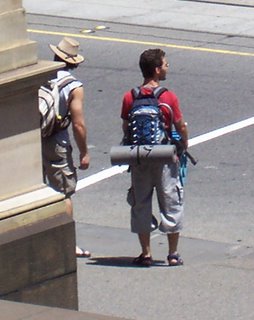I’ve discussed earth and sky; now it’s time to look at the people of Australia. Prior to my trip down under, I did some research into the manners and mores of my host country, so as not inadvertently to commit a faux pas and risk offending someone. I understood that there are some countries where, if you do not polish your shoes or if you fail to inquire about the health of a contact’s family, you will be considered a hopeless boor and no one will have anything to do with you. From my research I discovered, among other things, that Australians dress informally and have egalitarian sensibilities. (Okay; so leave the bowtie at home.) Among the things to avoid are: (1) failing to buy the next round of beers, if you are next in line to do so; (2) mentioning your hosts’ convict forebears; (3) assuming that Alice Springs is a suburb of Adelaide; (4) inquiring of a Sydney Anglican whether he believes in the Real Presence or the apostolic succession of bishops, and (5) asking whether your new acquaintances know Paul Hogan or Rupert Murdoch personally. Armed with this information, I figured I couldn’t go wrong.

What I found when I actually arrived was that Australians are a warm and hospitable people, with unfailing good humour and a ready willingness to forgive the missteps of visitors. The first people I met at the Melbourne airport were Richard and Annette Edlin, whom I quickly came to like very much. They are originally from New Zealand but have lived in Australia for some years now. The person with whom I spent the most time was Ken Dickens, who had been designated my host during my visit. Once more, I found him to be an amiable person and enjoyed the times we spent together, including our memorable excursion into the centre of Melbourne wednesday afternoon. Thanks are due him for his generous hospitality. Over the following days I met and talked with scores of people, most of whom were attending the Transforming Education Conference. I was so warmly embraced by them that I immediately felt at home and scarcely thought myself to be a stranger in a new country. It’s difficult to imagine a nation filled with such genuine people having any external enemies.
There are, of course, many similarities between Australia and Canada. (To be sure, climate is not one of them.) Both are immigrant countries with predominantly European roots. Both grew to nationhood within the context of the British Empire/Commonwealth. Both countries’ constitutions combine a Westminster-style parliamentary/cabinet system with American-style federalism. But there are differences as well.
Australians are mad about sport — virtually any sport. But among their favourites are rugby-related Australian-rules football, football proper (formerly called soccer) and cricket, all of which I have reason to think I saw briefly on the television set in my room at the Holiday Inn. (All right, I confess — I'm not much of a sport fan.) Last year the Australian Soccer Association became the Football Federation Australia, which means that there are now at least two games being played under the name “football.” If there is any confusion about this, I didn’t detect it. Back home we have hockey. And then, of course, there’s hockey. Oh, and did I mention hockey? (Oh yes, also CFL football, but who pays attention to that?) The Commonwealth Games will shortly be taking place in Melbourne, and no visitor to that city would ever be allowed to leave without being informed of this repeatedly on every street corner. After returning to Canada, I discovered that a Greek Cypriot, 20-year-old Marcos Baghdatis, has been dazzling the spectators at the Australian Open Tennis Tournament, also in Melbourne. The impressive thing is that, unlike many North Americans, Australians do not seem content to remain spectators. Most everyone I saw during my visit appeared to be fit, suggesting that ordinary Australians themselves participate in sporting events, or at least engage in vigorous physical activity.
Australian humour is unique as well. Canadian humour tends to be self-deprecating. We’re good at poking fun at ourselves, as evidenced by our venerable national institution, the Royal Canadian Air Farce. (I’ll leave out Rick Mercer, who can be somewhat caustic at times.) By contrast, Australians like to give each other a hard time – something that may take some getting used to on the part of outsiders. However, if they give you, the visitor, a hard time, that means they like you and have come to think of you as one of their own. There’s no complaining about that. (Um, let's put aside Dame Edna Everage for now.)
My second evening in Melbourne, Richard and Annette invited me to tea in their rooms at Glenn College, where a number of people had gathered to socialize. That was my first taste of Australian conviviality. I had not yet uttered a word — my first keynote address would come the following morning — yet I was already being made welcome. I even received a gift for my daughter: a set of children’s Hebrew letter flashcards and an accompanying workbook to help children learn and practise writing the shapes of the letters. (With her fascination for foreign languages, our Theresa took to these immediately.) At the end of the conference — after my third keynote — I was presented with two wrapped gifts: Steve Parish's Australia: the journey, a beautiful photographic survey of the country; and Australian Politics and Government: The Commonwealth, the States and the Territories, a useful look at Australian federalism.
Small wonder I fell in love with the country and its people. One day I would love to return and take my wife and daughter with me.
Next: Antipodean sojourn V: politics.
No comments:
Post a Comment